Comprehensive Guide to Garden Fence Installation in Chalk Farm
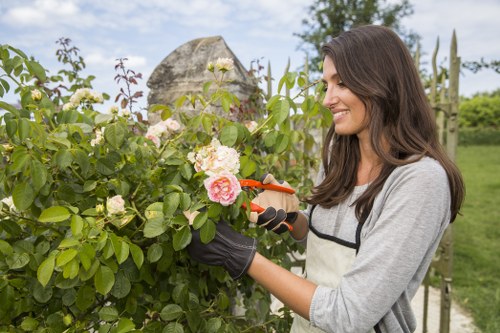
Installing a garden fence in Chalk Farm can transform your outdoor space, providing privacy, security, and enhancing the aesthetic appeal of your home. Whether you're looking to keep pets safe, create a boundary, or simply add a decorative element to your garden, choosing the right fence is crucial.
Chalk Farm, known for its vibrant community and picturesque surroundings, offers a variety of styles and materials suitable for different garden environments. From traditional wooden fences to modern metal and vinyl options, the choices are endless.
Understanding the local regulations and property boundaries is essential before commencing your fence installation project. This ensures compliance with any community guidelines and avoids potential disputes with neighbors.
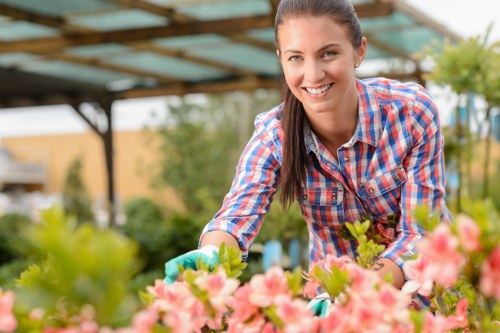
Choosing the Right Fence Material
Selecting the appropriate material for your garden fence is a key decision. It affects not only the appearance but also the durability and maintenance required.
Wooden Fences: Popular for their natural look, wooden fences are versatile and can be customized to fit any garden style. They require regular maintenance, such as staining or painting, to protect against weather elements.
Metal Fences: Offering strength and longevity, metal fences like wrought iron or aluminum are low-maintenance and provide a classic or contemporary look. They are ideal for those seeking durability without frequent upkeep.
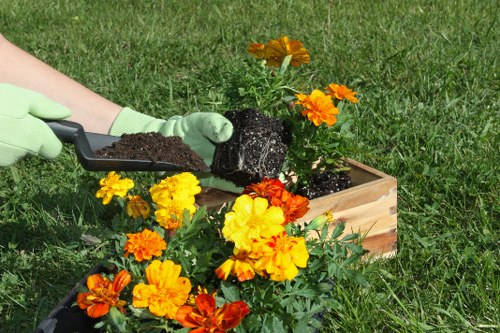
Vinyl and Composite Options
Vinyl Fences: Vinyl is a low-maintenance alternative to wood, resistant to rot and pests. It comes in various colors and styles, making it a practical choice for modern gardens.
Composite Fences combine wood fibers with plastic, offering the appearance of wood without the associated maintenance. They are eco-friendly and highly durable.
When deciding on a material, consider factors such as climate, garden size, and personal preference to ensure the fence meets your needs.
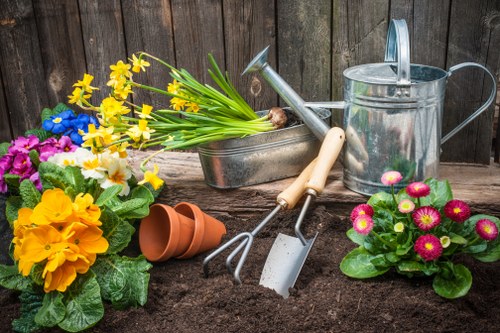
Design and Style Considerations
Your garden fence should complement the overall design of your property. Here are some popular styles to consider:
- Picket Fences: Perfect for a quaint, cottage-style garden.
- Privacy Fences: Taller and solid, ideal for creating a secluded space.
- Ornamental Fences: Feature decorative elements for a stylish and elegant look.
Additionally, the color and finish of your fence can significantly impact the visual harmony of your garden. Neutral tones blend seamlessly, while bold colors can make a statement.
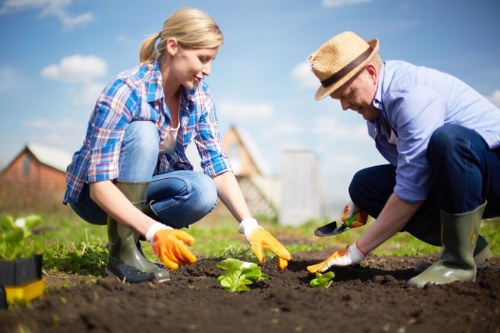
Installation Process
Proper installation is vital for the fence's longevity and functionality. Here’s a step-by-step overview:
- Planning: Measure your garden area and decide on the fence layout.
- Permits: Check with Chalk Farm local authorities for any required permits.
- Materials: Purchase the necessary materials based on your chosen fence type.
- Foundation: Set strong foundations for fence posts to ensure stability.
- Assembly: Construct and install the fence panels according to the design plan.
- Finishing: Apply any desired finishes, such as paint or sealant, to protect the fence.
Local Regulations and Permits

Before installing a fence in Chalk Farm, it’s important to be aware of local regulations. These may include height restrictions, boundary lines, and materials allowed within the community.
Obtaining the necessary permits ensures that your fence complies with local laws and avoids any legal issues. It’s advisable to consult with local authorities or a professional fence installer familiar with Chalk Farm’s regulations.
Additionally, if your property is part of a conservation area or has a listed status, there might be additional restrictions on the type and appearance of the fence.
Cost Considerations
The cost of installing a garden fence in Chalk Farm can vary based on several factors:
- Material: Different materials come with different price points.
- Size: The length and height of the fence impact the total cost.
- Labor: Professional installation fees can vary based on complexity.
- Permits: Any required permits add to the overall expense.
Budgeting appropriately and obtaining multiple quotes from reputable installers can help manage costs effectively.

Maintenance and Longevity
Maintaining your garden fence ensures it remains in good condition for years. Regular upkeep tasks may include:
- Cleaning the fence to prevent dirt and mildew buildup.
- Inspecting for and repairing any damages or wear.
- Repainting or resealing wooden fences to protect against weathering.
Metal and vinyl fences generally require less maintenance but should still be periodically checked for any issues.
Enhancing Garden Aesthetics

A well-chosen fence can significantly enhance the beauty of your garden. Consider integrating elements such as:
- Climbing plants or vines to add greenery and soften the fence’s appearance.
- Decorative finials or ornaments for added character.
- Lighting fixtures to highlight the fence and improve nighttime visibility.
These additions not only beautify your garden but also increase the overall value of your property.

Privacy and Security Benefits
Beyond aesthetics, garden fences provide essential privacy and security benefits:
- Shielding your garden from prying eyes.
- Preventing unauthorized access and enhancing property security.
- Creating a safe space for children and pets to play freely.
Choosing a fence that meets your privacy and security needs is crucial for peace of mind.
Moreover, a sturdy fence can deter unwanted wildlife and reduce noise pollution, making your garden a more tranquil retreat.
Top 15 Nearby Areas to Chalk Farm for Fence Installation
- Camden Town A bustling area with diverse architectural styles, ideal for customized fence designs.
- Kentish Town: Known for its residential charm, offering various fencing options to match local homes.
- Belsize Park: An upscale neighborhood where elegant and high-quality fences are preferred.
- Primrose Hill Offers scenic views, perfect for taller fences that maintain the aesthetic skyline.
- West Hampstead A family-friendly area where durable and safe fences are in demand.
- Finchley Road: A commercial and residential mix, requiring versatile fencing solutions.
- Swiss Cottage: Prefers modern and stylish fences that complement contemporary homes.
- Hampstead: Historic area with restrictions on fence styles, necessitating specialized installations.
- Regent's Park: Green spaces nearby where environmentally friendly fencing materials are favored.
- Marylebone Central location with a preference for sleek and minimalist fence designs.
- Furzedown: Suburban feel, ideal for traditional wooden or metal fences.
- Brunswick Square: Features classic architecture, best complemented by ornamental fencing.
- Pimlico Urban setting requiring fences that balance privacy with city aesthetics.
- Elephant & Castle: Diverse community needing adaptable fencing solutions.
- Archway Close proximity to public transport, with a demand for secure and stylish fences.
Choosing a Professional Fence Installer in Chalk Farm

Hiring a professional fence installer ensures that your garden fence is constructed correctly and efficiently. Look for installers who:
- Have experience with various fence types and materials.
- Are familiar with Chalk Farm’s local regulations and permit requirements.
- Provide clear quotes and timelines for the project.
- Offer warranties or guarantees on their workmanship.
Reading reviews and asking for referrals can also help you find a reputable installer who meets your specific needs.
Additionally, a professional installer can offer valuable advice on design choices and materials that best suit your garden and budget.
Sustainable and Eco-Friendly Fencing Options
For environmentally conscious homeowners, there are several sustainable fencing options available:
- Bamboo Fences: Renewable and biodegradable, bamboo offers a natural and exotic look.
- Recycled Materials: Fences made from recycled metals or plastics reduce environmental impact.
- Living Fences: Using hedges or shrubs as a natural barrier provides ecological benefits.
Incorporating eco-friendly materials not only benefits the environment but can also create a unique and appealing garden feature.

DIY vs. Professional Installation
While some homeowners may consider a DIY approach to save costs, professional installation offers several advantages:
- Expertise in handling materials and tools.
- Ensuring compliance with local regulations.
- Time efficiency and quality workmanship.
However, for those with the necessary skills and time, a DIY project can be a rewarding experience.
Carefully assess your capabilities and the project's scope before deciding between DIY and hiring a professional.
Conclusion
Installing a garden fence in Chalk Farm is a worthwhile investment that enhances the beauty, privacy, and security of your home. By carefully selecting the right materials, design, and professional installer, you can create a stunning and functional outdoor space that suits your needs and complements the local environment.
Remember to consider local regulations, budget, and maintenance requirements to ensure your fence remains a valuable addition to your property for years to come.
Frequently Asked Questions

1. Do I need a permit to install a garden fence in Chalk Farm?
Yes, depending on the height and location of the fence, you may require a permit. It’s advisable to check with the local Chalk Farm authorities before starting your installation.
2. What is the most durable fencing material for Chalk Farm’s climate?
Metal and vinyl fences are highly durable and resistant to Chalk Farm’s varying weather conditions, making them excellent choices for long-lasting barriers.
3. How much does garden fence installation typically cost in Chalk Farm?
The cost varies based on materials, fence length, and installation complexity. On average, prices can range from £500 to £3000. Getting multiple quotes from local installers can help you find the best deal.
4. Can I install a garden fence myself?
While it is possible for those with DIY skills, professional installation ensures the fence is correctly built and complies with local regulations. Consider your experience and the project’s scope before deciding.
5. How long does a garden fence last?
The longevity of a fence depends on the material and maintenance. Wooden fences may last 10-15 years with proper care, while metal and vinyl fences can last 20 years or more with minimal maintenance.